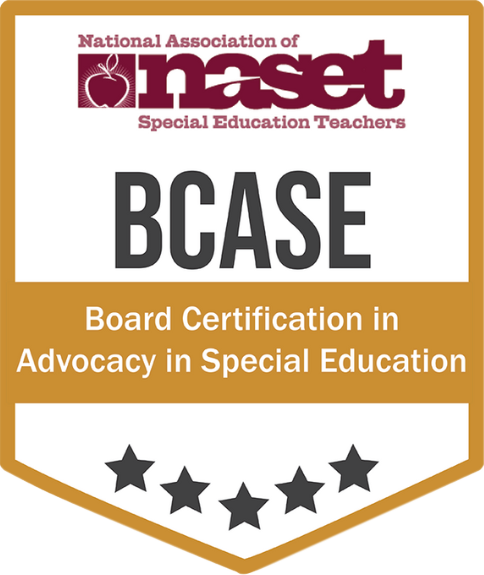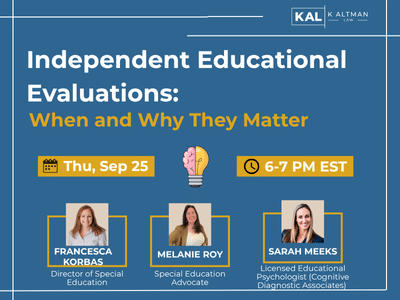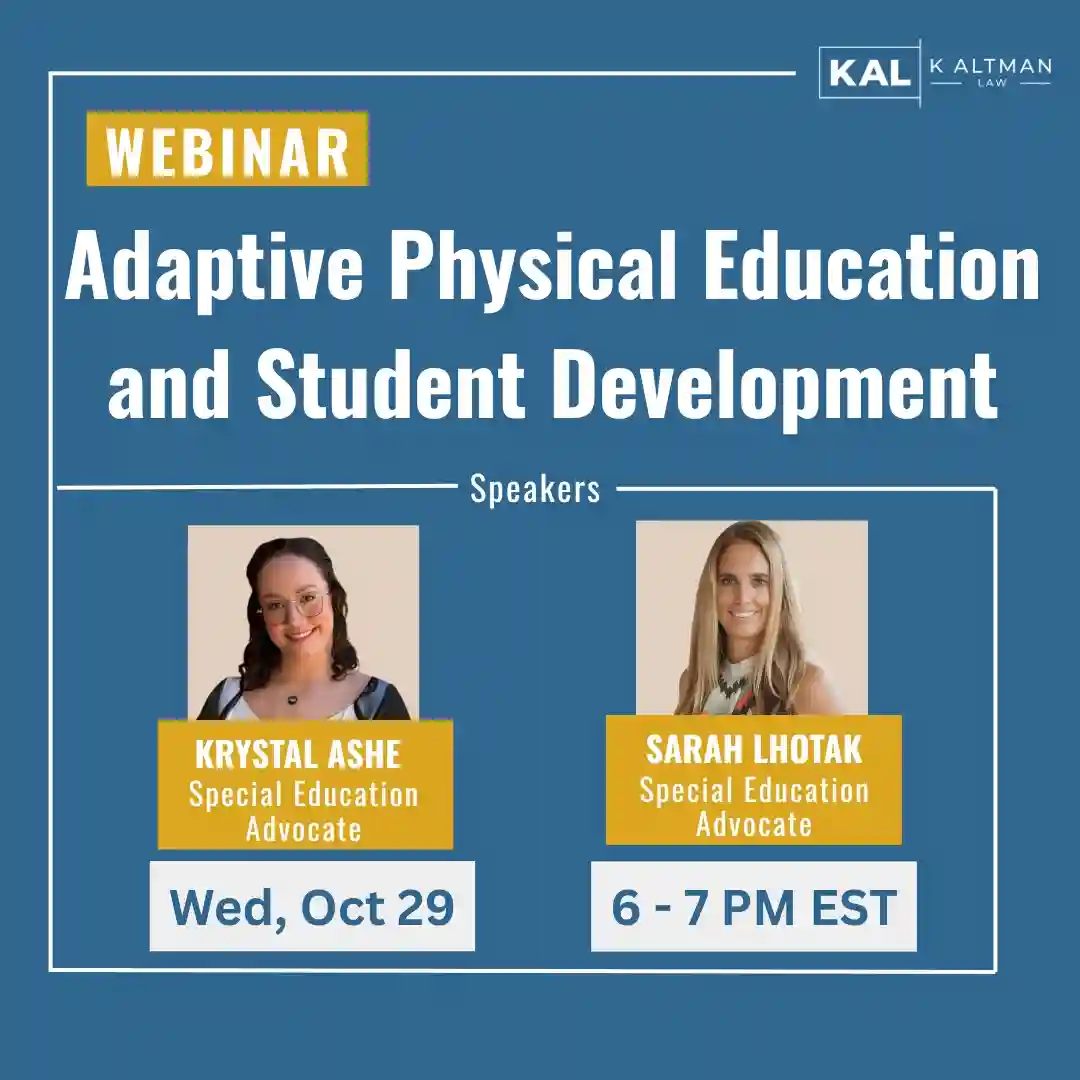Empowering Students with Disabilities and Their Families with Expert Legal Advocacy Solutions
Empowering Students with Disabilities and Their Families with Expert Legal Advocacy Solutions
How We Help Families
Special Education Eligibility
Least Restrictive Environment (LRE)
Free Appropriate Public Education (FAPE)
Individualized Education Program (IEP)
An IEP is a tailored plan for students with disabilities. Special students may face issues like inadequate assessment, insufficient support and untrained educators. Experienced special education advocates at K Altman Law can help address these challenges by providing expert guidance on IEP development, ensuring access to appropriate services and resources and advocating for your child’s rights in the special education system.
Section 504
Section 504 is a civil rights law prohibiting disability discrimination. Special students may encounter inadequate accommodations, compliance issues and limited understanding of their rights. Team of special education advocates at K Altman Law can help resolve challenges related to Section 504 plans, ensuring appropriate accommodations and advocating for your child’s rights.
Manifestation Determination Review
Alternative Placement
Alternative Placements in Special Education refer to educational settings outside of the traditional classroom for students with special needs. These students may face challenges in finding the best alternative placement that meets their individual needs and abilities. K Altman Law offers professional services of Special Education Advocates to help navigate the process and ensure that the student’s rights and needs are being met in their alternative placement.
Due Process
Due process safeguards special students’ rights in educational disputes. Issues may include complex regulations, inadequate representation, and miscommunication. Special education advocates at K Altman Law offer expert guidance on due process for students with disabilities, ensuring fair representation and strong advocacy. With our unwavering commitment and expertise, we’ll navigate due process complexities together, championing your child’s rights and securing their educational future.
Office of Civil Rights (OCR)
The Office of Civil Rights (OCR) plays a crucial role in protecting the rights of students with special needs. Special needs students may face challenges in navigating the OCR process, such as a lack of understanding of their rights and difficulties in communicating their needs. K Altman Law offers professional services of Special Education Advocates to help students and their families understand the OCR process and ensure that their rights are protected and upheld.
CONTACT US NOW
FOR YOUR CASE CONSULTATION
How can I effectively advocate for my child’s special education needs?
Effective advocacy involves understanding your rights, active participation in IEP meetings, consistent communication with school staff, meticulous record-keeping, and seeking legal counsel when necessary to ensure your child’s needs are appropriately addressed.
What constitutes an Individualized Education Plan (IEP)?
An IEP is a legally binding document developed for each public school child requiring special education. It outlines the child’s present levels of performance, annual goals, specific special education and related services, and how the child will participate in the general education curriculum.
What are the parental rights regarding a child with special needs?
Parents possess significant rights under IDEA, including the right to participate in all decisions concerning their child’s education, to receive prior written notice of meetings and proposed actions, to provide consent for evaluations and services, and to dispute school decisions through due process.
Who qualifies for special education services?
Children are typically eligible for special education services if they possess one of the 13 qualifying disabilities under IDEA and if that disability adversely impacts their educational performance, necessitating specially designed instruction.
What services does K Altman Law provide?
K Altman Law offers comprehensive legal services in special education, encompassing assistance with IEPs and 504 plans, guidance on behavioral and disciplinary matters, legal representation in due process proceedings, and expert counsel on special needs planning.
Why is it important to have a standardized IEP?
A standardized IEP helps ensure consistency and understandability across different teams and locations. It should follow the student and provide a complete picture of their needs no matter where they are.
What is FBA (Functional Behavior Assessment) in special education?
A Functional Behavior Assessment (FBA) in special education is a process used to understand the purpose or function of a specific behavior exhibited by a student. The primary goal of an FBA is to identify the reasons behind a student’s challenging behaviors, especially when these behaviors impede learning or social interaction. It involves several key steps:
-
Identification: Clearly defining the problematic behaviors in observable and measurable terms.
-
Data Collection: Gathering information about the behaviors through observation, interviews, and record review.
-
Analysis: Analyzing the data to identify patterns in the behavior, focusing on the antecedents (what happens before), the behavior itself, and the consequences (what happens after).
-
Hypothesis Development: Forming hypotheses about the function of the behavior, such as seeking attention or avoiding tasks.
-
Intervention Strategies: Developing tailored strategies to address the behavior, which may involve environmental changes, teaching new skills, and modifying responses to the behavior.
-
Implementation and Monitoring: Implementing the strategies and continuously monitoring their effectiveness.
-
Review and Adjustment: Reviewing and adjusting the plan as necessary based on ongoing monitoring.
The FBA process is collaborative, involving educators, specialists, and parents, and is crucial for creating an effective Behavior Intervention Plan (BIP) that meets the student’s unique needs.
What is reverse inclusion in schools in the USA?
Reverse inclusion refers to the practice of including general education students in special education classes. This approach has started to gain some attention as school districts become more considerate of the universal needs of all students. However, there is still a divide in many schools where students who require special education are often set aside, resulting in a need for improved inclusivity.
What should be done when the behaviors of a child with an IEP are significantly interfering with their learning?
When a child’s behaviors are significantly interfering with their learning, two things should happen. The IEP team must conduct a functional behavior assessment (FBA), and a behavior intervention plan should be in the process of being completed.
Where should educational and related services be delivered for a child with an IEP?
Educational and related services should be delivered in an environment that meets the child at their level. This could be a general education classroom, a special education setting, or another appropriate learning environment agreed upon by the IEP team.
What happens if the parent of a child with disabilities still needs assistance after an IEP meeting?
If the parent of a child with disabilities still needs assistance after an IEP meeting, they can reach out to an advocate or someone who can come to the table with you. These experts can help analyze the data, look at the evaluations, and provide professional recommendations to you and the school-based team.
What can parents of a student with an IEP do if they unknowingly agreed to something they don’t approve of?
In such situations, parents can call for a new IEP meeting. The previous agreement is not the end, and parents can navigate through the situation with the help of special education advocates.
We Guide Families Through the System and Provide Expert Representation
Special education advocacy consultations are a good way for parents and guardians to learn more about the services provided by the special education advocates at K Altman Law. We help family members and children with their special education needs. You may not understand how to proceed after learning that an educational institution may not be fulfilling its duty to provide your child with the services and accommodations they need. The following is what you can expect during a special education advocacy consultation:
-
Discussing the present needs of parents, guardians and children who may need to revise an Individualized Education Plan or schedule an appointment with a medical specialist
-
Assessing the current services and accommodations provided to the student by an educational institution
-
Formulating response plans for pending evaluations, upcoming assessments and unexpected diagnoses
-
Reviewing relevant educational and medical information to help the child achieve their goals
INSIGHTS
Our Success Stories
00.
Student Denied Special Education Eligibility Ultimately Qualifies for an IEP
Available Services for Clients with Non-Legal Special Education Issues
Having a special education advocate on your side can reduce some of the stress and anxiety experienced by parents and guardians who are helping children with non-legal special education issues. The following are some of the services offered by K Altman Law for individuals seeking a special education advocate:
Attending Individualized Education Plan (IEP) meetings with parents and guardians
Attending Section 504 meetings with parents and guardians
Analyzing reports and evaluations to provide professional recommendations regarding placement, programming, accommodations and related services.
Drafting complaints, responses, and requests to school districts, school boards, and administrators
Navigating Manifestation Determination Review Hearings and appeals
Helping parents and guardians understand their rights and their children’s rights under laws pertaining to special education in the United States
Advising parents, guardians, and family members about eligibility requirements for special education
Sharing updated information regarding national, state and local resources for children with disabilities
Filing Due Process or OCR complaints
Let us hear your story!
Services for Special Education Students
Learning that your child has been denied the services or accommodations they require can be alarming. A special education advocate helps families address the problems they have with educational institutions. The following are some of the most common problems students may face at school:
Lack of appropriate evaluations to inform decision-making
Denial of special education services or accommodations
Insufficient behavioral supports
Lack of progress monitoring toward annual goals and objectives
Incomplete or missing transition plans
Lack of related provider services
Lack of access to curricula
Disregard for parent input regarding services and needs
Disagreement over educational placement
Federal and state laws may be implicated in conflicts between special education students and their schools. Our special education advocates work with attorneys at K Altman Law to assist students and their families with every aspect of their special education needs.
What Our Clients Say About Us
An Appreciative Client
Anonymous
Student with Mozaic Fragile X Syndrome
Anonymous
Helping a Female Student with his IEP
Anonymous
Helping a Family with their Special Child's Education System
Anonymous
School-based Team
Jane Bazz
Helping a Male Student with his IEP
Robb Walters
Our Special Education Team
Call Today to Speak with a Special Education Advocate at K Altman Law
The special education team at K Altman Law assists parents, guardians and students who are not receiving the services they require from an educational institution. We help children with developmental disabilities get the support and accommodations they need to thrive inside and outside the classroom. Call K Altman Law at 888-984-1341 to speak to a special education advocate today.























